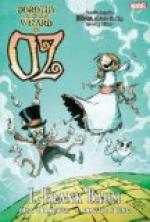“I’m sure we are in no danger,” said Dorothy, in a sober voice. “We are falling so slowly that we can’t be dashed to pieces when we land, and this country that we are coming to seems quite pretty.”
“We’ll never get home again, though!” declared Zeb, with a groan.
“Oh, I’m not so sure of that,” replied the girl. “But don’t let us worry over such things, Zeb; we can’t help ourselves just now, you know, and I’ve always been told it’s foolish to borrow trouble.”
The boy became silent, having no reply to so sensible a speech, and soon both were fully occupied in staring at the strange scenes spread out below them. They seemed to be falling right into the middle of a big city which had many tall buildings with glass domes and sharp-pointed spires. These spires were like great spear-points, and if they tumbled upon one of them they were likely to suffer serious injury.
Jim the horse had seen these spires, also, and his ears stood straight up with fear, while Dorothy and Zeb held their breaths in suspense. But no; they floated gently down upon a broad, flat roof, and came to a stop at last.
When Jim felt something firm under his feet the poor beast’s legs trembled so much that he could hardly stand; but Zeb at once leaped out of the buggy to the roof, and he was so awkward and hasty that he kicked over Dorothy’s bird-cage, which rolled out upon the roof so that the bottom came off. At once a pink kitten crept out of the upset cage, sat down upon the glass roof, and yawned and blinked its round eyes.
“Oh,” said Dorothy. “There’s Eureka.”
“First time I ever saw a pink cat,” said Zeb.
“Eureka isn’t pink; she’s white. It’s this queer light that gives her that color.”
“Where’s my milk?” asked the kitten, looking up into Dorothy’s face. “I’m ’most starved to death.”
“Oh, Eureka! Can you talk?”
“Talk! Am I talking? Good gracious, I believe I am. Isn’t it funny?” asked the kitten.
“It’s all wrong,” said Zeb, gravely. “Animals ought not to talk. But even old Jim has been saying things since we had our accident.”
“I can’t see that it’s wrong,” remarked Jim, in his gruff tones. “At least, it isn’t as wrong as some other things. What’s going to become of us now?”
“I don’t know,” answered the boy, looking around him curiously.
The houses of the city were all made of glass, so clear and transparent that one could look through the walls as easily as through a window. Dorothy saw, underneath the roof on which she stood, several rooms used for rest chambers, and even thought she could make out a number of queer forms huddled into the corners of these rooms.
The roof beside them had a great hole smashed through it, and pieces of glass were lying scattered in every direction. A nearby steeple had been broken off short and the fragments lay heaped beside it. Other buildings were cracked in places or had corners chipped off from them; but they must have been very beautiful before these accidents had happened to mar their perfection. The rainbow tints from the colored suns fell upon the glass city softly and gave to the buildings many delicate, shifting hues which were very pretty to see.




